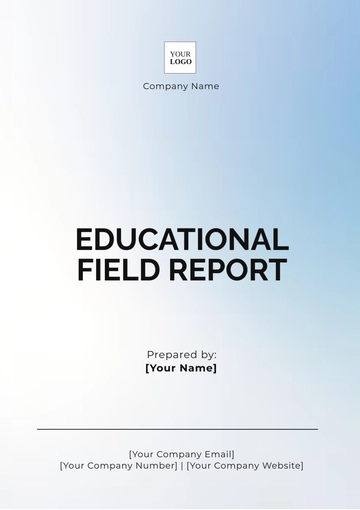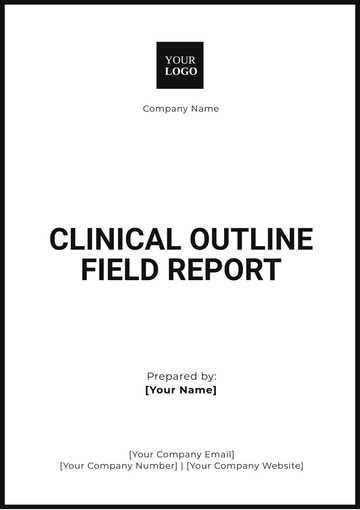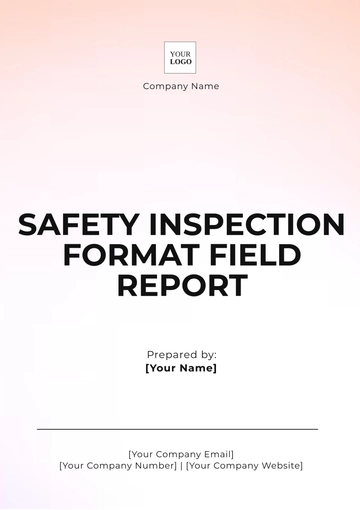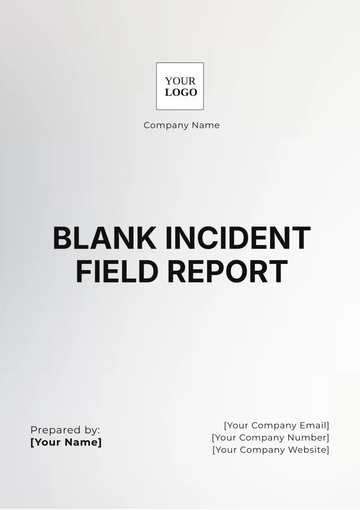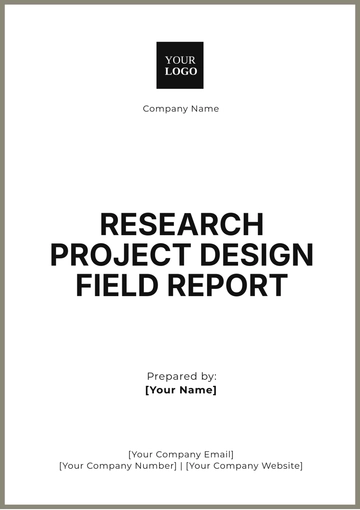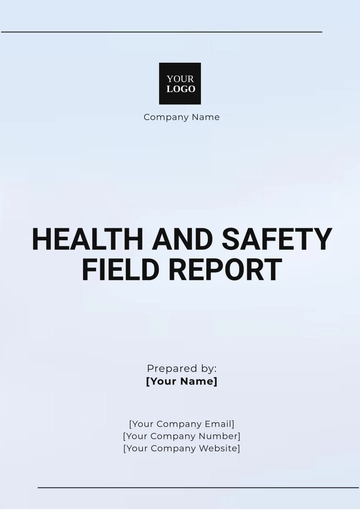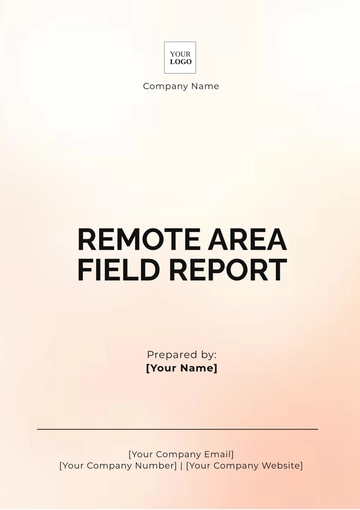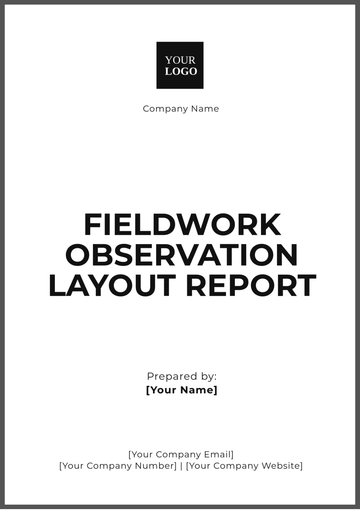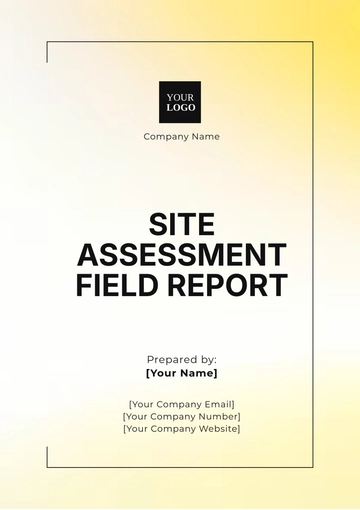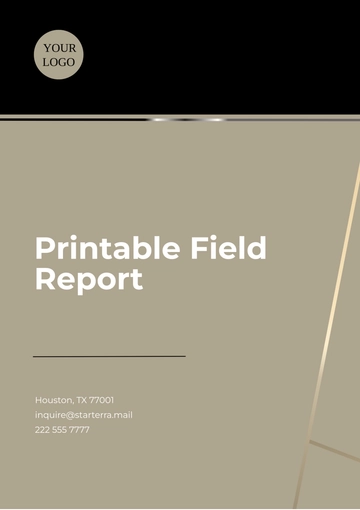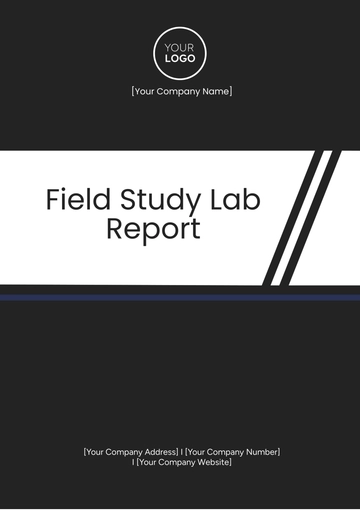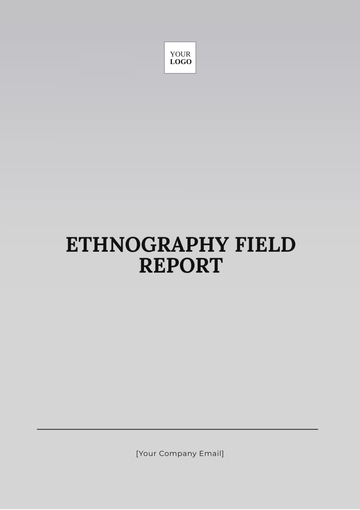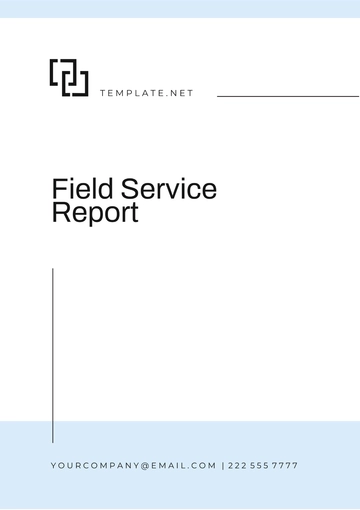Free Clinical Outline Field Report
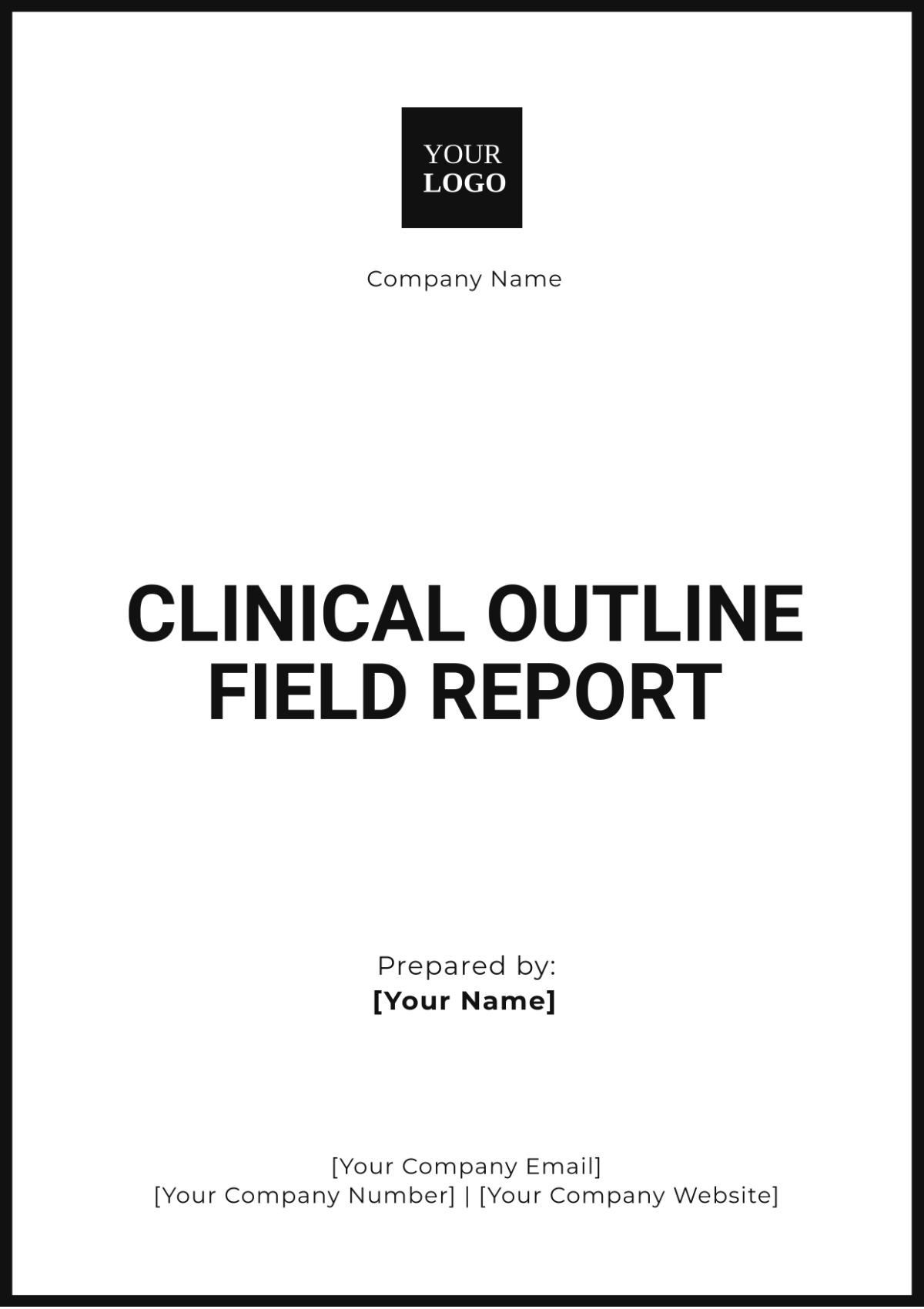
Prepared by: [Your Name]
Date: [Date]
I. Introduction
This Clinical Outline Field Report provides a comprehensive overview of the clinical activities and insights gained during my fieldwork at ZenExa Hospital. The purpose of this placement was to bridge the gap between theoretical learning and practical application in patient care while refining clinical skills under the supervision of experienced healthcare professionals. The six-week placement offered diverse opportunities to observe, participate, and assist in various medical departments, helping me gain a more profound understanding of hospital operations and patient care dynamics.
The clinical experience took place in three primary departments: Internal Medicine, Surgery, and Emergency Care. This diversity allowed me to experience a range of patient scenarios, treatment methodologies, and team collaborations.
II. Objectives
A. Primary Objectives
To apply theoretical knowledge in a clinical setting
The goal was to translate classroom learning into real-world scenarios, practicing skills such as patient history taking, physical examination, diagnosis formulation, and treatment plans under supervision.To develop and refine clinical skills, including patient assessment and care planning
The hands-on experience allowed me to refine vital clinical skills such as taking vital signs, interpreting lab results, administering medications, and understanding individualized care plans.To understand the dynamics of patient-practitioner interactions
Interacting with patients and learning how to address their concerns compassionately and professionally was central to improving communication skills and emotional intelligence in healthcare settings.
B. Secondary Objectives
To gain insight into the operation of healthcare systems and multidisciplinary team collaboration
Observing how various departments work together in the hospital setting provided a clearer understanding of the healthcare system's organization, from administrative procedures to team-based care.To increase awareness of ethical and cultural considerations in patient care
Exposure to diverse patient populations helped me appreciate the cultural, social, and ethical aspects of healthcare. These include respecting patient autonomy, providing culturally sensitive care, and understanding the ethical dilemmas that can arise in clinical practice.
III. Methods/Approach
A. Procedure
During this placement, I worked directly under the supervision of healthcare professionals across different departments. I was involved in hands-on patient assessments, treatment planning, and assisting in medical procedures. The approach was systematic, following a structured clinical schedule where I observed and occasionally participated in patient care tasks.
I was assigned a variety of tasks, such as:
Taking patient histories and conducting initial assessments
Assisting in diagnostic tests and procedures
Observing and participating in patient rounds
Documenting patient progress and treatment plans
Participating in team meetings to discuss patient care
B. Tools and Resources
Patient Records and Case Files
Access to detailed patient records and case files was vital for understanding patient histories, monitoring their progress, and formulating care plans.Diagnostic Equipment
Tools such as stethoscopes, blood pressure monitors, electrocardiogram (ECG) machines, and imaging devices (e.g., X-rays and CT scans) were essential for conducting patient assessments and diagnosing conditions.Clinical Guidelines and Standard Operating Procedures (SOPs)
Following the hospital's SOPs and guidelines ensured that I adhered to best practices in patient care. This included learning the proper protocols for infection control, patient safety, and emergency response.
IV. Observations/Findings
The clinical placement provided valuable insights into both patient care and the operational aspects of healthcare delivery. Here are some notable observations from each department:
Department | Key Activities | Notable Observations |
|---|---|---|
Internal Medicine | Patient assessments, medication administration | Prompt identification of symptoms, leading to effective care plans and early intervention. |
Surgery | Surgical assistance, postoperative care | Collaboration between surgeons, anesthetists, and nurses was critical to patient recovery. |
Emergency Care | Urgent patient evaluations, triage | High-stress environment emphasizes the importance of quick decision-making and prioritization. |
Pediatrics | Pediatric assessments, child patient management | Handling pediatric patients required a different communication approach, focusing on reassurance and trust-building. |
Oncology | Cancer care management, chemotherapy administration | Observing the emotional challenges faced by patients and families gave me insight into the role of psychological support in treatment. |
V. Analysis/Reflection
This fieldwork experience was pivotal in transforming my theoretical knowledge into practical expertise. The following reflective points summarize the key learning outcomes:
Skill Enhancement:
The opportunity to perform hands-on patient assessments significantly improved my ability to recognize early symptoms, make quick decisions, and adapt treatment plans. For example, during a high-pressure situation in the Emergency Care unit, I was able to assist in triage, where swift identification of life-threatening conditions played a crucial role in patient survival.Interpersonal Communication:
Interacting with patients of different backgrounds and conditions taught me the importance of clear, empathetic, and culturally sensitive communication. For instance, I encountered several patients who spoke limited English, which required me to work with translators to ensure effective communication and provide quality care.Team Collaboration:
Observing the multidisciplinary teams in action, particularly in Surgery and Emergency Care, highlighted how successful patient outcomes are often dependent on the cohesive efforts of doctors, nurses, physical therapists, social workers, and administrative staff. The importance of clear communication and mutual respect within teams was evident in ensuring optimal patient care.
VI. Conclusion
This clinical placement has been a crucial stepping stone in my professional development, offering a wealth of knowledge and experience that will shape my future career as a healthcare professional. Not only did I enhance my technical skills, but I also gained a deeper understanding of patient care dynamics, ethical considerations, and the importance of teamwork in achieving successful patient outcomes.
The clinical experience has reinforced my commitment to providing compassionate, patient-centered care, and I am confident that the skills I have developed will serve me well as I continue my training and enter the healthcare workforce.
VII. Recommendations
Based on my experiences and observations during this clinical placement, I propose the following recommendations:
Increased Exposure to Various Departments:
While I gained valuable experience in Internal Medicine, Surgery, and Emergency Care, exposure to other departments, such as Psychiatry, Geriatrics, and Radiology, could provide a more well-rounded clinical education. This will allow future students to develop a broader range of skills and insights into different aspects of healthcare.Continued Emphasis on Interdisciplinary Teamwork:
It is essential to continue emphasizing the importance of interdisciplinary collaboration in clinical curricula. Future students should be provided more opportunities to engage with various healthcare professionals to understand the collective approach to patient care.Incorporating Communication Skills Workshops:
Clear and effective communication with patients, families, and medical teams is crucial in healthcare. Workshops and training sessions focusing on communication skills, cultural competence, and emotional intelligence should be incorporated into the curriculum to enhance patient interactions.Focus on Stress Management in High-Pressure Environments:
In departments such as Emergency Care, where quick decisions are essential, providing training in stress management tech
- 100% Customizable, free editor
- Access 1 Million+ Templates, photo’s & graphics
- Download or share as a template
- Click and replace photos, graphics, text, backgrounds
- Resize, crop, AI write & more
- Access advanced editor
Introducing Template.net’s Clinical Outline Field Report Template is a fully customizable and editable tool designed for medical professionals. It helps document patient observations, clinical procedures, and case studies efficiently. Editable in our Ai Editor Tool, this template ensures accurate, detailed reporting, tailored to your specific clinical needs. Simplify your clinical documentation with ease and professionalism using this customizable template.
You may also like
- Sales Report
- Daily Report
- Project Report
- Business Report
- Weekly Report
- Incident Report
- Annual Report
- Report Layout
- Report Design
- Progress Report
- Marketing Report
- Company Report
- Monthly Report
- Audit Report
- Status Report
- School Report
- Reports Hr
- Management Report
- Project Status Report
- Handover Report
- Health And Safety Report
- Restaurant Report
- Construction Report
- Research Report
- Evaluation Report
- Investigation Report
- Employee Report
- Advertising Report
- Weekly Status Report
- Project Management Report
- Finance Report
- Service Report
- Technical Report
- Meeting Report
- Quarterly Report
- Inspection Report
- Medical Report
- Test Report
- Summary Report
- Inventory Report
- Valuation Report
- Operations Report
- Payroll Report
- Training Report
- Job Report
- Case Report
- Performance Report
- Board Report
- Internal Audit Report
- Student Report
- Monthly Management Report
- Small Business Report
- Accident Report
- Call Center Report
- Activity Report
- IT and Software Report
- Internship Report
- Visit Report
- Product Report
- Book Report
- Property Report
- Recruitment Report
- University Report
- Event Report
- SEO Report
- Conference Report
- Narrative Report
- Nursing Home Report
- Preschool Report
- Call Report
- Customer Report
- Employee Incident Report
- Accomplishment Report
- Social Media Report
- Work From Home Report
- Security Report
- Damage Report
- Quality Report
- Internal Report
- Nurse Report
- Real Estate Report
- Hotel Report
- Equipment Report
- Credit Report
- Field Report
- Non Profit Report
- Maintenance Report
- News Report
- Survey Report
- Executive Report
- Law Firm Report
- Advertising Agency Report
- Interior Design Report
- Travel Agency Report
- Stock Report
- Salon Report
- Bug Report
- Workplace Report
- Action Report
- Investor Report
- Cleaning Services Report
- Consulting Report
- Freelancer Report
- Site Visit Report
- Trip Report
- Classroom Observation Report
- Vehicle Report
- Final Report
- Software Report



